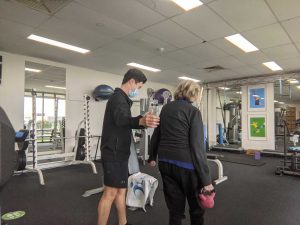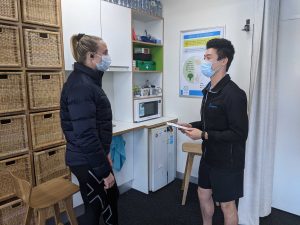How Exercise Physiologists work with other health professionals to provide you QUALITY care
Today Longevity Exercise Physiology Drummoyne, Edgecliff, Marrickville, Bella Vista, Randwick, Pymble, Balmain and Neutral Bay look into the ways in which Exercise Physiologists work with other allied health professionals and treating practitioners to get excellent results for patients.
A person’s health is made up of a myriad of components, each tied intimately with each other, hence the vast number of health professions out there. What’s important however, is how they all work together and bridge the pathways between their areas of expertise. This ensures that the patient receives the highest quality of care through improved health outcomes, continuity of care and reduced inefficiencies. As Exercise Physiologists, we specialise in provision of tailored exercise interventions for people with acute to chronic health conditions (e.g. osteoarthritis, diabetes, heart disease, neurological conditions). Let’s have a look how EPs work with other health professionals:
Dieticians and Nutritionists
It is a known fact that exercise and diet are two inseparable aspects of one’s health. As Exercise Physiologists, our role is to work closely with dieticians/nutritionists by aligning our health goals for the patient and providing exercise intervention that complements the patient’s diet plan. This will facilitate or amplify the achievement of their health outcomes.
Patients, especially those with cardiometabolic conditions such as diabetes, obesity, heart disease and high blood pressure will greatly benefit from seeing both a dietician/nutritionist and an EP at the same time. For example, a patient with a goal to reduce weight will need a combination of exercise and diet to focus on reducing body fat and preserving muscle mass; a patient wanting to reduce blood pressure will have a far greater improvements with a combination of both diet and exercise compared with one method alone.

Physiotherapists and Chiropractors
Patients would typically see physiotherapists or chiropractors during the acute stage of managing a health condition (i.e. an injury or a flare-up) to receive treatment. After this stage, you might be wondering: what if they want to return to their daily activities without any future flare-ups? What if they want to return to performance and avoid re-injury in the future?
This is where an Exercise Physiologist comes in. Our role as EPs here is to communicate with the practitioner and take a patient from their acute phase of management, onto function. For example, after receiving manual therapy from a physiotherapist for a lower back injury, we would typically perform whole body assessments on movement to determine particular areas of focus (e.g. strength, mobility, stability), and then prescribe a individualised exercise program towards the patients goals. This fills in the important pathway between the onset of an acute condition and returning to original function and performance.

Doctors and Specialists
As Exercise Physiologists, we specialise in seeing patients with various medical conditions. Our role as EPs is to improve the outcomes for these patients and treat their health conditions that have typically been diagnosed by a doctor or specialist. In fact, almost all of our patients are currently seeing a doctor or have been referred by one.
A patient’s health pathway is extremely complex, which is why it is essential that we work together with other health care professionals. This creates a strong, coordinated effort that produces the best health outcomes for the patient and their life
The benefits of prescribing both exercise and medication (and in some cases exercise over medication) is well established for a vast array of health issues, which is why patients benefit from seeing a doctor and EP concurrently. For example, exercise affects health outcomes equally as well as medication for coronary artery disease, pre-diabetes and stroke (without the side effects)1. A doctor may also refer to an EP for benefits in mental health, osteoarthritis, chronic pain, rehabilitation, post-surgical treatment and heart health. We work in close communication with doctors and specialists to address specific health outcomes through exercise interventions, whilst they oversee the provision medical advice and treatment.
A patient’s health pathway is extremely complex, which is why it is essential that we work together with other health care professionals. This creates a strong, coordinated effort that produces the best health outcomes for the patient and their life.
References:
- Naci, H., & Ioannidis, J. (2013). Comparative effectiveness of exercise and drug interventions on mortality outcomes: metaepidemiological study. BMJ, 347(oct01 1), f5577-f5577. doi: 10.1136/bmj.f5577
Written by Jackie Cheung

